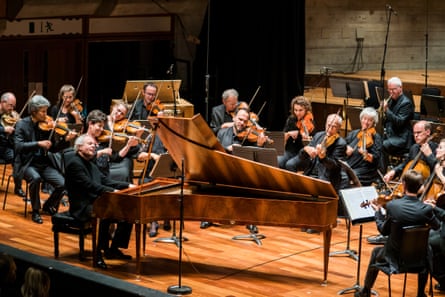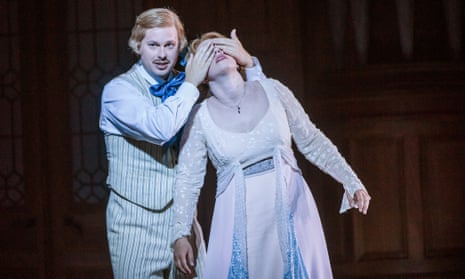Many times in Glyndebourne’s new staging of Debussy’s Pelléas et Mélisande, characters put their hands over their own or other people’s eyes, a shield from the enigmatic horrors of the love triangle playing out before them. From a safe seat in the auditorium it was tempting to do the same. Not that the set looked bad; on the contrary. In his house debut, the high-profile Norwegian director Stefan Herheim, admired on the European opera circuit for more than a decade, and his designer, Philipp Fürhofer, fixed the action in a faithful replica of Glyndebourne’s 1920s organ room.
Forging connections between venue and staging is a Herheim trademark. Why, in this case, he thought it a good idea to choose this grandiose space, where John Christie held run-throughs when he was trying to get the festival started in the 1930s, is obscure. The instrument’s enormous pipes just about suggest the opera’s forest-castle setting but it’s a push, luckily made visually rich by some ingenious lighting by Herheim and Tony Simpson.
Debussy chose as his text Maeterlinck’s symbolist drama because of its powerful intimations and mystery. He had found in its author a writer who “only hinted at things”, allowing the composer “to graft my dream upon his”. Herheim has grafted his konzept on to Debussy’s sensuous, ambiguous opera with graphic heavy-handedness. Characters are made to emote, or circle round household staff where stillness is required. There’s enough nastiness going on without turning the jealous Golaud into a pederast – forcing himself on his young son, Yniold, who naturally is revealed to be wearing a Mélisande-like long blond wig – leaving a momentarily gobsmacked audience in puzzled silence as the act ended.
Debussy’s brilliance in this revolutionary 1902 piece was to keep paradoxes in perfect balance. The natural speech patterns that drive the music are in polar contradiction to the staccato oddness of the characters. The only singer who really caught this surreal quality was Christina Gansch as Mélisande. The Austrian soprano managed to convey passion, despair, incomprehension, all in good French, which wasn’t always the case. An exception was native speaker Chloé Briot, the young mezzo-soprano singing Yniold.
Herheim directs the obsessive Golaud as permanently angry, leaving Christopher Purves little option but to bellow, when his voice is capable of so many other colours (as his new album of Handel arias demonstrates). Karen Cargill was luxury casting as the mysterious Geneviève, an all too brief house debut. Let’s hope she returns to bigger things. Brindley Sherratt has all the makings of a creepily patriarchal Arkel, but had to walk the role owing to a throat infection. Richard Wiegold sang impressively from the side. The American baritone John Chest’s Pelléas struggled with high notes on first night, and hasn’t yet made this blank-canvas role his own.
Proust listened down the telephone to Pelléas, in a pioneering form of live streaming via a Parisian subscription service, which must have been a long and neck-breaking endeavour (nothing, though, compared to Parsifal, which he consumed in the same way). Hear Glyndebourne’s production broadcast live, or go in person, to a semi-staging at the Proms on 17 July. You’ll get the Albert Hall’s organ pipes as a backdrop, but there’ll be less to interfere with the majestic playing of the London Philharmonic Orchestra under Robin Ticciati, after an interrupted start now bursting into his own as Glyndebourne’s music director. At least he understands nuance.

Joy untrammelled coursed through the Orchestra of the Age of Enlightenment’s all-Haydn concert – broadcast live on Radio 3, and repeated tonight in Cheltenham – with its new principal artist, András Schiff. The bristling energy of Symphony No 94 in G, “Surprise”, set the pace. The players, led by the invincible Kati Debretzeni, themselves grinned along with the audience at those shock fortissimos in the slow movement that gives the work its nickname. Haydn may have been playing a joke there, but surprise runs throughout: the enigmatic slow opening, the novel woodwind, the muted drama of the timpani rolls.
As a conductor, Schiff, as you would expect of a performer who lets the music inhabit him rather than him it, makes modest gesture, eyeing players beadily rather than jabbing a baton (he doesn’t use one). He gave ample support to the excellent soloists (Charlotte Beament, Helen Charlston, Nick Pritchard, Dingle Yandell) and lean Choir of the Age of Enlightenment in the late Harmoniemesse (1804). Schiff’s own powers of expression and humour let fly in the Piano Concerto No 11 in D (1784), with all its trills, snaps, quips and Hungarian Gypsy fire. You’d pay to hear this man play the spoons.
Star ratings (out of 5)
Pelléas et Mélisande ★★★
OAE: Schiff’s Surprise ★★★★★

Comments (…)
Sign in or create your Guardian account to join the discussion